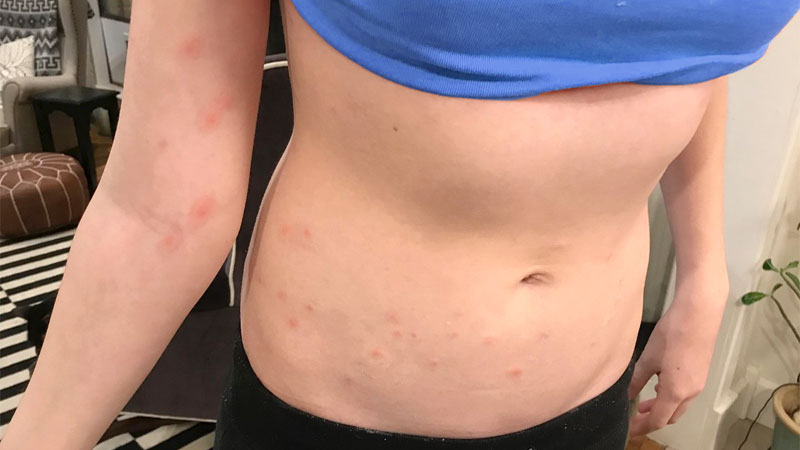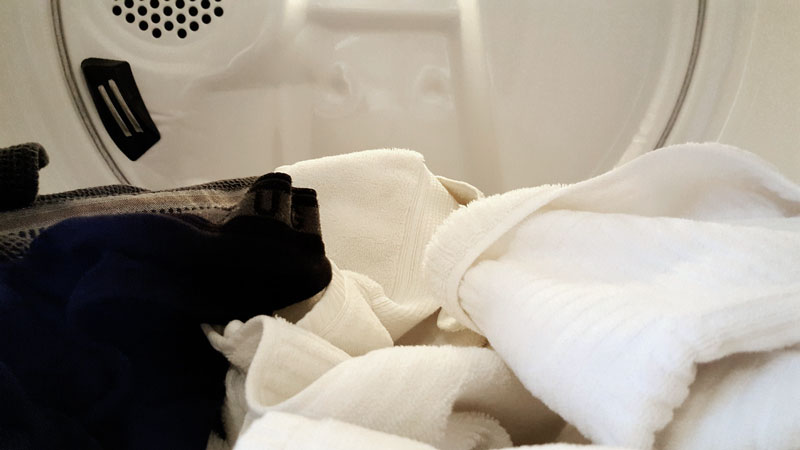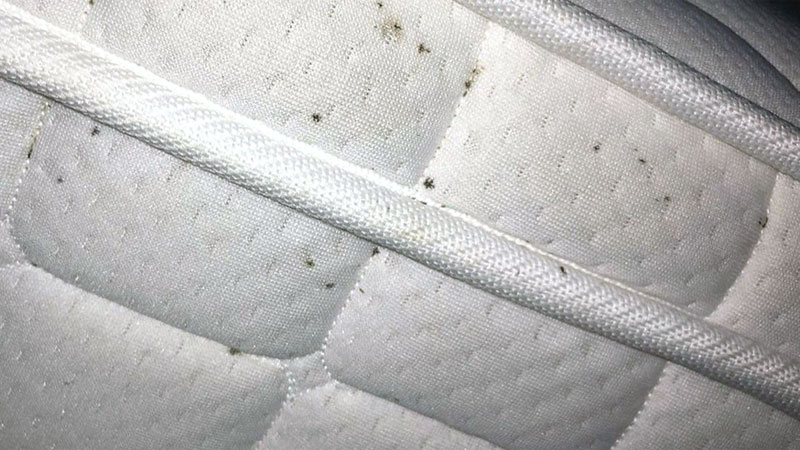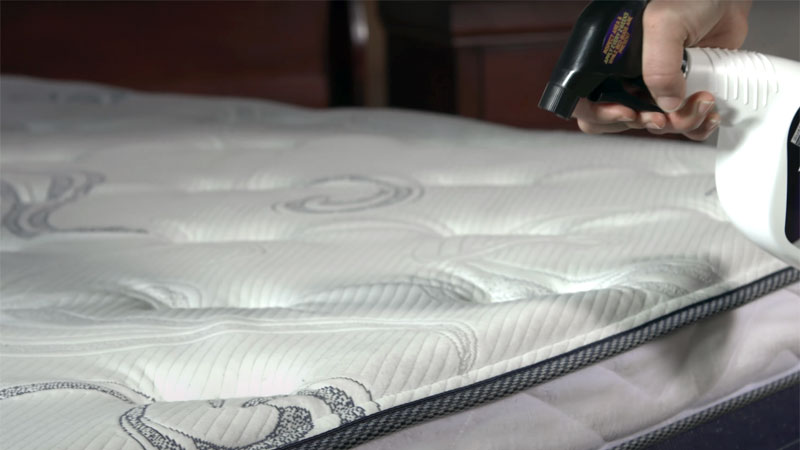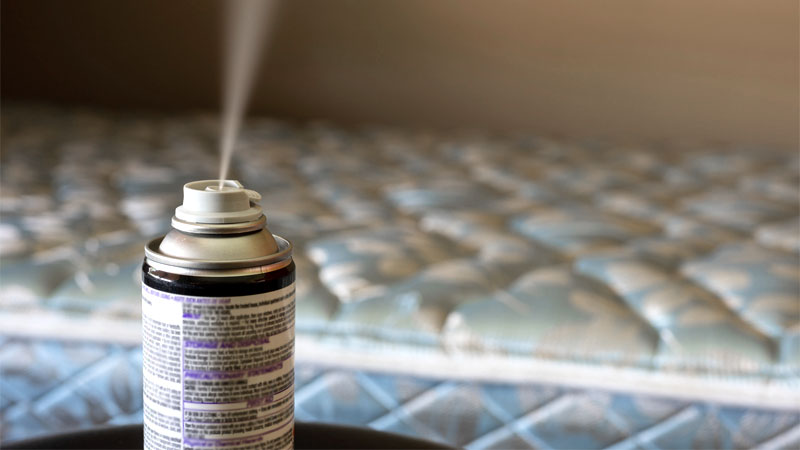We talk a lot about certain critters on this site, some far more than others due to the many types or difficulty in removal. A perfect example of this is the infamous bed bug.
What do you do if you suspect a bed bug infestation in the bedroom? Let’s look at how to verify and remove the infestation effectively.
Bed Bugs in the Bedroom
As with any other indoor critter (including humans), bed bugs prefer to congregate where the food is. Bed bugs prefer blood, so the most prevalent location is your bedroom. However, you should still inspect your entire home in case they’ve spread.
But today we’re looking at just the bedroom, since this is where most bites happen. This is also the most likely place an infestation will start if you think you were exposed to these critters.
What Are the Main Causes of Bed Bugs?
Bedbugs don’t just appear in your home. They get there by hitching lifts in your clothes, luggage, and other items. However, they cant actually cling to the clothes themselves, so most often they’re hiding in folds, pockets, between your socks and shoes, etc.
You’ll usually get them from contact with people who have an infestation or in public places where the bed bug was hitching a ride on someone else and fell off.
Once in your home, a fertile female simply needs one good blood meal to start reproducing, laying up to seven eggs per day for a couple weeks before needing to mate again. This can result in a very quick population explosion, so the moment you see the signs or think you may have been exposed, you need to take action.
Signs of a Bed Bug Infestation
The first sign you’ll likely have is a mysterious bite or series of bites. You’ll need to verify it was a bed bug that bit you by checking the bite area. Also, while sightings can and do happen, it’s pretty rare and you might actually be seeing another common bedroom pest.
Another common sign is the appearance of tiny black specks on the bedsheets. If you add a drop of water or put a damp paper towel on it, this spot may expand into a red spot. This is proof that you’re dealing with bed bug frass (poop).
Finally, bed bug casings (shells) are often found in places where bed bugs have been, such as mattress seams.
Do Bed Bugs Ever Go Away on Their Own?
So now that we know you have bed bugs, that famous little question likely pops into the back of your mind: “If I ignore them, will they go away?”
Unfortunately, bad things NEVER go away if you ignore them, not in habits, not in politics, and certainly not with pests. Instead, ignoring any problem invariably allows it to fester and become infinitely worse.
Of all the myths surrounding bedbug infestations, this one’s probably the most dangerous.
Bedroom Tactics
Okay, so now that we’ve established there’s a problem in the bedroom (hopefully no puns intended), it’s time to deal with it. This is a multi-step process which can be broken down using the SITTR (pronounced “sitter”) method:
- Sort
- Isolate
- Treat the Room (in 2-3 parts)
- Terminate with a Bomb (Optional)
- Repeat
Step 1 – Sort It Out
While in most problems you need to get your priorities in order, it’s a little different for your bedroom. Clear some space in the middle of the floor and put some clean baskets or bins there. If you have a carpet, you may wish to sprinkle some diatomaceous earth in this space in case it’s a bed bug hiding place.
Now, go through your room and begin sorting everything into those bins.
- Clothes, linens, stuffed animals, and other heat-safe fabrics should go in one container. Make sure to shake each one out (aiming away from the container) before adding it. These will get a heat treatment.
- Go through all of your knick-knacks that aren’t heat-safe one by one, examining every crack and crevasse for signs of bed bugs. Place any that pass the test into another bin. For potentially infested items, sort them into the third group.
- Larger objects that aren’t heat-safe and have multiple crevices or openings should go in a third bin, again checking for bugs when possible. Note that this bin is going to be the one most at-risk of the three, so you’ll want to keep it tightly sealed.
Step 2 – Isolate the Room
Now that you’ve gotten things sorted, it’s time to take the bins to their treatment areas. When you do so, be sure to close off the infested room and keep everyone out.
You can also keep the bed bugs in by spraying a line along the doorway and the door frame with some essential oils diluted in water.
Step 3.1 – Treat the Bins
You know those three bins you’ve filled? Here’s what to do with them.
Bin #1
Well, the contents of the first bin should go directly into the dryer. The bugs will die almost instantly at 140 degrees, but a dryer that can reach at least 122 degrees can kill bed bugs within minutes.
Toss the clothes in on the highest setting and let the bugs and their eggs fry. This is a cheap and effective heat treatment that most people have access to. Just don’t take them to a laundromat!
Bin #2
The second bin should be sealed and taken to a room where you know there are no bed bugs. This bin is full of items you’ve already checked thoroughly and will need to be checked again later, just in case you missed some eggs. Sealing it will help ensure any stowaway bed bugs don’t get out.
Bin #3
The best way to handle the third bin is to have several bed bug traps ready and stick them into the bin before resealing it. Try to avoid putting the traps near heat-sensitive items, however, since bed bug traps work by producing heat to mimic human body temperatures.
Step 3.2 – Do You Need to Throw Away the Mattress?
Thankfully, you DO NOT have to chuck your mattress away if you follow some basic treatment methods. The methods we’re about to discuss not only stop bed bugs but will help control a number of other mattress pests as well.
Using a Steamer
If you don’t own a fabric steamer, you really should put it on your shopping list. Steam cleaners get your carpet, upholstery, and other fabric surfaces much cleaner than a simple vacuum and can be absolutely devastating to a wide range of pests.
On a mattress, it’s an absolute miracle worker! If you don’t want to invest in a larger model, Black+Decker makes some great handheld models that are just as effective.
Steamers create temperatures that can kill bed bugs, bed worms, dust mites, fleas, and a whole host of other mattress pests. Just take it slow to ensure the heat remains long enough to score your kills. Not only will this kill nymphs and adults, it can destroy their eggs as well.
Even better, it deep-cleans the mattress, lifting out a ton of dirt and dead skin cells while killing off bacteria and other contaminants.
But if you don’t own a steamer and aren’t able to rent one, you can always fall back on a regular clothes iron. These can be used in a similar manner to steamers. Just be careful not to burn the mattress by leaving the iron in one place for too long.
Mattress Covers
This simple bed covering is a pure godsend. Not only does it prevent any bed bugs (or other pests) still in your mattress from getting out, it’s also waterproof, meaning you can safely clean it without ever taking it off the bed. However, you can also take it off to wash as needed.
A decent mattress cover is quite affordable, can be steam cleaned, and (if you so choose) can remain on your mattress and/or box spring for the rest of its usable life.
Pre-Treating Linens
This neat little trick can help ensure there are no bed bugs camping out in the linen closet. Simply take any fresh linens you want to put on the bed and toss them in the dryer on a high temp setting for 10 to 20 minutes. Put them on your bed immediately after.
Not only will this kill any pests, but it’s a wonderful feeling on a cold winter’s night to hop into a toasty warm, freshly made bed.
Step 3.3 – Sprays and Traps (Optional)
Note: You can do this step with 4, on its own, or opt to use 4 instead.
Surprisingly enough, there are some decent chemical sprays out there. Unfortunately, both chemical and homemade sprays tend to work best on contact, so your mileage can vary greatly here. Crack shots who can hit a fast-moving apple seed will fare well, but those with lower coordination may be batting 1,000.
Overall, products such as Ortho Home Defense are effective enough to recommend. Keep in mind there are around 12 species of bed bug, only two of which bear the common label. You’ll need to make sure these sprays are formulated to tackle the species you’re dealing with.
On the other hand, you can make a homemade spray. This consists of essential oils, garlic, or rubbing alcohol mixed with water. Again, remember these sprays tend to be contact killers and will generally only serve as a repellent otherwise.
Use the sprays to soak down all of the cracks and crevasses in the room, including those in the closets and any furniture. If you’re lucky, what bed bugs it doesn’t manage to kill will be chased out into the open where you can get in a direct hit.
Do Bed Bug Traps Work?
There are a number of different tricks these traps use to fool bed bugs. As always, your mileage will vary, but they’re generally helpful in controlling a bed bug population.
Step 4 – Terminate with a Bomb (Optional)
Note: You can do this step with 3.3, on its own, or opt to use 3.3 instead.
The dreaded bug bomb (fogger) is highly effective, but also a real nasty piece of work. However, there’s no doubt as to its effectiveness. You’ll need to seal all entrances. It’s also best to cover the door in plastic on the outside with one corner left unsealed.
Set the bomb off and get out of the room ASAP, sealing the plastic the rest of the way. It will take a few hours for the bomb to do its job, so be sure to follow all instructions carefully.
When it’s time, pick someone who can hold their breath. Crack a corner of the door seal, so they can run in, open the window, and run back out. Give the room a few more hours to air out, then go in and scrub everything down top to bottom to make it safe for children and pets to enter.
Step 5 – Repeat
Eggs take only a few days to hatch, so you’ll want to repeat this whole process in about two weeks. If it fails or your problem spreads outside of the bedroom, you might need to invest in an exterminator to tackle the infestation.
Bedroom Bed Bug FAQ
We often get questions regarding home remedies and bed bug hiding places. The following are some of the more common questions.
Do I Have to Call an Exterminator?
Have you ever noticed that most bedbug articles online are found on a pest control company’s website which gives vague answers and then tells you you need to hire them?
Here at RMC, we believe giving reliable, trustworthy advice is more important than making money. In most cases, bedbugs can be eliminated without calling in the experts.
However, if you have a severe infestation or have babies in the home suffering from bed bug bites, it may be best to contact a pest control professional.
Do I Have to Quarantine?
Since the COVID lockdowns, we’ve been getting this question more often. The good news is that isolation isn’t necessary. However, there are some basic steps you should follow that match etiquette for contagious infections such as the flu.
The first step is to run your clothes through a hot dryer. Remember, hot water isn’t enough, so you can skip the washer if the clothes are clean. Put the treated clothing in an airtight container.
Store it in a room you’ve confirmed has no bedbugs (such as a bathroom or vestibule). When planning to go out, strip down, enter the room, dress, and leave immediately so there’s minimal risk of hitchhikers.
Next, be sure to call ahead and notify any public places (schools, offices, etc.) that you’ve been exposed to bedbugs. You can also let them know any precautions you’re taking. This step is important because it allows your community to track the spread of bed bugs.
Where are the Most Common Hiding Places?
Everyone knows these critters hide in the seams of mattresses and in bed frames. But they can also hide in carpets, upholstered furniture, seams of dressers and other furniture (if your credit card fits, bedbugs fit), etc.
Another thing to keep in mind is that bed bugs climb some surfaces, allowing them to hide behind picture frames and inside electrical outlets. This includes the legs of furniture and textured walls.
Does X Home remedy Kill Bed Bugs?
We’ll be perfectly honest here. Steamers, cleaning products (such as Fabuloso), essential oils, and other home remedies ONLY work if they come in direct contact with bed bugs. All of these methods can help reduce the population. However, they may not be enough to completely eliminate an infestation on their own.
Traps and bombs will usually end up being necessary unless you can kill the bugs before they lay any eggs.
- How to Get Rid of Hawks - March 8, 2024
- How to Get Rid of Pill Bugs (Rolly Pollies) - March 1, 2024
- How to Get Rid of Groundhogs (Woodchucks) - February 5, 2024


